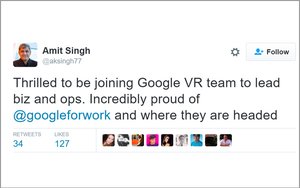Commentary
Will Google, Bing Use Virtual Reality To Influence Searches?
- by Laurie Sullivan , Staff Writer @lauriesullivan, May 16, 2016
 Google's future in artificial intelligence and virtual reality (VR) will take consumers along for the ride. The travel, retail and clothing industries can offer Web sites
and mobile apps full of images, but an experience can convince consumers of an amazing adventure just for them.
Google's future in artificial intelligence and virtual reality (VR) will take consumers along for the ride. The travel, retail and clothing industries can offer Web sites
and mobile apps full of images, but an experience can convince consumers of an amazing adventure just for them.
A picture gets brands only so far, but telling a story through an
experience opens the world to discovery and searches, providing an opportunity to expand on local, earned and paid-search advertising campaigns -- so much so that former Google enterprise
lead Amit Singh jumped to the company's virtual reality team last week, demonstrating a strong link between search and
VR.
Although 90% of Google's revenue comes from advertising, the company is always looking for opportunities to augment experiences with technology.
There are early opportunities to design search into virtual reality campaigns, but not all consumers are on board, according to the IBB Consulting Group study of more than 8,000 U.S. online consumers released Monday.
While 42% of consumers interested in virtual reality would watch VR-created ads in exchange for free content and 38% would watch ads as long as they are interesting and relevant, another 34% who are interested in VR said they would not watch VR ads at all, per the study.
IBB set out to find the opportunities beyond gaming by better understanding consumer viewpoints around interest, investments, potential business strategies, and ad-supported models among the 8,000 U.S. online consumer study participants.
In the long term the headsets will need to become smaller and less cumbersome, and even fade into the background. In April, Sundar Pichai, Google CEO, outlined a world where AI becomes central to everything Google does, and how the concept of devices will fade allowing software to become the dominant factor.
One of the more difficult challenges marketers face remains keeping one eye on the future so the brand doesn't get left behind, viewed by consumers as outdated and lazy. At the MediaPost Search Insider Summit, some brands told SearchBlog that CMOs want results on today's technology. The challenge is in doing both.
Where do consumers consume VR content near-term? The study asked how consumers expect to pay and receive content. Some 38% said free on-demand from sites like YouTube; 37%, download and own from iTunes and Amazon; 32%, monthly subscription; 28%, free live broadcast; 26%, paid on-demand with no ads; and 16%, none of the above.
The IBB study did not delve into the connection between virtual reality and search advertising and marketing, but there is clearly a connection to enhance campaigns. Microsoft has the biggest near-term opportunity through Bing search from Cortana on the Windows 10 taskbar, where one in four searches are voice-activated, until the clunky VR headsets become more portable.



